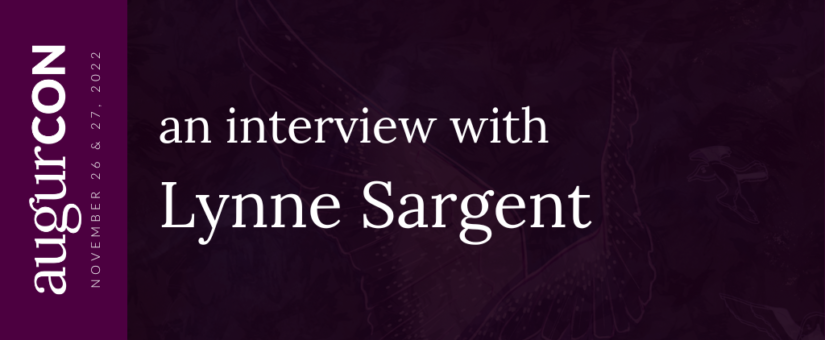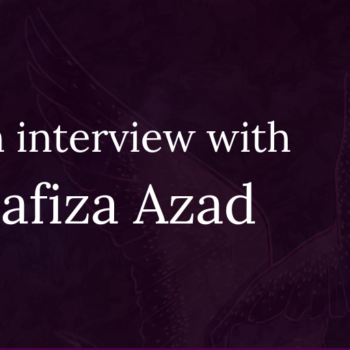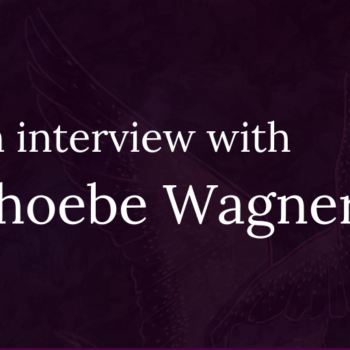
An interview with Lynne Sargent #AugurCon2022
- Posted by Augur Blog
- On November 23, 2022
- 0 Comments
- author interview
On November 26 & 27 we’re hosting our second-ever AugurCon, our virtual celebration of speculative literatures! We’re joined by over 45 amazing guests, including authors, poets, editors, and publishing professionals, to explore the intersections of the world we know—and the ones we dare to imagine.
We connected with Lynne Sargent, writer of the collection A Refuge of Tales, who is a workshop host at this year’s AugurCon.
Get your ticket to attend their workshop:
Quill to Paper: Workshopping Poetry
Sunday, November 27 at 11 AM–1 PM EST / 8 AM–10 AM PST
To see the full weekend program schedule, visit our website.
Tell us about your writing process! How did you start writing poetry/fiction? Do you have any favourite writing haunts (i.e. places) or rituals?
I started seriously writing poetry and fiction in high school. The poetry spark was ignited by a Grade 9 book report assignment where the task was to write a poem about the book. It was like a dam had been broken inside my brain and after that I just never stopped writing. I would scribble poetry in the margins of my notebooks in math class. From there, some of my poems started turning into shorter and longer fiction and since then it’s been a steady trajectory of taking the various crafts more seriously.
I love doing first drafts on paper if I can! I like having a solid notebook that can fit easily into a purse or small backpack, and I love writing with my fountain pens (current faves include my Benu Edelweiss and my TWSBI mini in Rose Gold) in various colourful, sparkly inks. I also really love writing while travelling or even just out and about stopping to write on benches in the park or at bars. One time I even composed a poem at a concert!
Do you have a favourite spec fic genre to read? To play in as a writer? If these genres are different, do they interact with each other? If so, how?
I’m definitely a huge sucker for both a) really philosophical, quiet SFF and b) retellings of any kind. I also play in this space a lot as a writer. I like the way that those sub-genres tend to inherently lend themselves to making certain kinds of arguments, and I really love fiction that makes me learn and think. Retellings are also really nice because you can feel really comfortable in a familiar story while at the same time have something subversive and different being told to you. Overall though, I read pretty widely and there’s only a few subgenres I specifically shy away from.
You’re moderating our workshop on speculative poetry, but you also recently tweeted about writing a novel draft. Does moving between mediums—short fiction, poetry, novels—feel natural to you? What are some of the challenges unique to each medium that really excite and inspire you?
Short answer, yes! I love reading all the things so it has always felt intuitive to me that I like writing all the things. To use a dance analogy: poetry is like improv, short stories are like creating and practicing a choreographed solo/duet/trio routine, and a novel is like plotting out a big production number or ballet. They all do different things for me and allow me to flex my creative muscles differently while all still being ultimately about words and all the incredible, magical things that words can do.
The challenge of poetry I find is making it complete (and knowing when it is!), as well as threading the needle of having that lovely dream logic and emotionality while still making it accessible to a reader who isn’t in your head. The challenge of a short story is finding a subject of appropriate length and novelty and then sticking all the character and theme bits to have it come together in a satisfying way at that length. Finally, the challenge of the novel is holding such a massive thing in your head, and doing all the organizational bits (I love spreadsheets!) that help it have a consistent tone and smooth arc, and then sustaining the writing energy across the marathon of time. I like all these different challenges and I would never want to pick just one medium!
You hold a PhD in Applied Philosophy and regularly blog about ethics, technology, and vulnerable populations. How does your creative work apply your foundations as an ethicist? Alternately, how does your work as an ethicist apply your foundations as a writer of poetry and fiction?
This is a great question. So as an ethicist I’m inspired by creative writing because in general I think stories are a lot more effective at making people change their minds than arguments are. You can have the best arguments in the world and often they will just not get seen or the people that need to see them won’t be persuaded, because at the end of the day we’re squishy feelings in meat sacks.
So, as a writer I really love taking my ethical positions and thoughts and using them in stories, or using stories as philosophical thought experiments both to work through the ethical challenges myself and then also hopefully using the character and art of creative writing to be a little more visible and persuasive to a general audience.
Say you’re talking to a writer who’s just starting out, who just penned their first poem or short story. What is the number one thing you would tell them that you wish someone had told you—the good, the ugly, the hopeful?
You need to find a way to love your own work and the work of your colleagues and contemporaries. You want to love the process of writing, the outcome of your writing, and the writing community you’re a part of. You’re not going to sell everything you write, and it’s a lot easier to not feel resentment/FOMO/whathaveyou when your colleagues and writers around you have successes if you’re genuinely fans of their work. You don’t have to like everything you write, or everything that’s out there, but you definitely want to like a lot of it or respectively you’re going to burn out and/or maybe find yourself a poor fit in the marketplace.
The great thing about this, though, is I think that basically everybody can cultivate a writing practice that works for them and is healthy for them that results in them writing things (whatever those things might be), and also that there’s so much good work being produced that if you put a little work into finding it, you will find a niche of things you like to read as well.
Hear more from Lynne: Get your ticket to AugurCon 2022
Lynne Sargent is a writer, aerialist, and holds a Ph.D in Applied Philosophy. They are the poetry editor at Utopia Science Fiction magazine. Their work has been nominated for Rhysling, Elgin, and Aurora Awards, and has appeared in venues such as Augur Magazine, Strange Horizons, and Daily Science Fiction. Their first collection, A Refuge of Tales is out now from Renaissance Press. To find out more, reach out to them on Twitter @SamLynneS or for a complete bibliography visit them at scribbledshadows.wordpress.com.
Join Lynne at AugurCon! Our panel on The Pen and the Sword: How Research Shapes Fantasy Worlds takes place on Sunday, November 27. Get your ticket to AugurCon 2022 now!




0 Comments